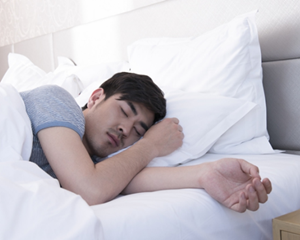Chinese residents sleep less than 7 hours per night, according to the 2024 Chinese National Healthy Sleep White Paper, released on Saturday by the Chinese Sleep Research Society.
中国睡眠研究会上周六发布的《2024中国国民健康睡眠白皮书》显示,我国居民每晚睡眠时间不足7小时。
The report said that Chinese residents go to bed on average after 12 am, with an average sleep duration of 6.75 hours per night.
该报告称,我国居民平均在凌晨12点之后就寝,平均每晚睡眠时间为6.75小时。
The report showed that 28 percent of respondents sleep less than 6 hours, and 64 percent have poor sleep quality.
报告显示,28%的受访者睡眠时间不足6小时,64%的受访者睡眠质量较差。
Most people have experienced sleep disturbances such as nocturnal awakenings, early awakenings, having trouble falling asleep and nocturnal urination.
大多数人都曾有过睡眠困扰,比如夜醒、早醒、入睡困难和夜间如厕。
The report also found that 59 percent of respondents suffer from insomnia, while only 19 percent have no sleep disorders.
该报告还发现,59%的受访者患有失眠,而完全无睡眠障碍人群仅占19%。

Only 29 percent of respondents go to bed before 11 pm, while 47 percent go to bed after 12 am, and 13 percent do so after 2:00 am.
只有29%的受访者在晚上11点之前睡觉,47%的人在凌晨12点之后睡觉,而又13%的人在凌晨2点之后睡觉。
Among them, the post-00s generation has an average bedtime of 12:33 am, while the pre-1970s has an average bedtime of 11:02 pm.
这其中,“00后”的平均入睡时间为00:33,而“70前”入睡时间为23:02。
Pre- and post-1970s retired people often suffer from nocturnal awakening, early awakening and nocturnal urination, while the post-00s and post-90s generations have trouble falling asleep.
“70前”及“70后”的退休人群常被夜醒、早醒、夜间如厕等问题困扰,而“00后”和“90后”的年轻人则困扰于入睡困难。
In terms of university students, 56 percent use their smartphones for more than 8 hours every day, 51 percent go to bed after 12 am, and 19 percent do so after 2:00 am.
就大学生群体而言,56%的人每天使用智能手机的时间超过8小时,且有51%的人在零点后入睡,更有19%的人在凌晨2:00后入睡。
The sleep duration of office workers on non-working days is 33 minutes longer than on working days.
上班族群体在非工作日的睡眠时间要比工作日多出33分钟。













